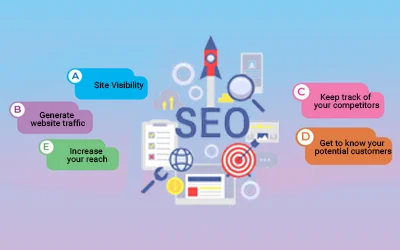If you have an online store, it becomes important to track its performance to see how it works. To measure your e-commerce business's progress, you can use ecommerce performance metrics.
eCommerce KPI metrics help businesses identify strengths, growth areas, and where improvements are needed. They track metrics like daily or monthly orders, repeat and new customers, and customer acquisition costs.
This blog covers common challenges of ecommerce with their solutions identified through KPIs. Let's explore some essential performance metrics of eCommerce.
10 Most Common and Important Ecommerce Performance Metrics
There are some common but important ecommerce KPI metrics that online stores should use. These will help them gain insights through ecommerce data analytics and make informed decisions. Here, we have provided the 10 crucial key metrics that you must keep track of to optimize your business.
1. Sales Conversion Rate
The conversion rate is a key eCommerce metric that helps online stores understand their real customers. Using eCommerce data analytics, you can track how well your marketing strategies encourage actions like signing up, placing an order, or clicking on a link.
If you feel your conversion rate is not moving leads effectively, you need to make changes or update content to persuade your audience to take action. This helps you generate more leads.
2. Customer Acquisition Cost
Customer acquisition cost is another one of the important ecommerce KPI metrics that help you know the cost of gaining a new customer.
eCommerce analytics tools provide insights, helping you understand your marketing techniques. If you are spending more money to gain a customer, then you need to change the customer approach strategy.
3. Average Order Value
The average order value shows the number of orders you receive in a month, and increasing the number of them month by month can help your business grow. By adopting a data driven eCommerce approach, businesses can increase their average order value, which is one of the core elements to drive sales and success.
You can boost it by giving your customers discounts, offers, and gift cards and showing related products to encourage them to add more to their cart.
4. Customer Retention Rate
Customer retention rate is one of the great ecommerce performance metrics that reflects repeat orders. This can be a serious concern if you focus on acquiring new customers but lose them after one or a few purchases.
Therefore, you need to focus on ecommerce analytics to gain insights into your customer retention rate. If your customers are not making repeat purchases, you should look for new products or change your customer relationship techniques.
5. Impressions
Impressions represent your visibility to your customers. It tracks your brand or product recognition among the audience through ads or content regardless of clicks. This helps you know if people are paying attention to your business.
With ecommerce data analytics, it’s very easy to know how many impressions you got for your business through PPC campaigns, social media, and blogs. If you are getting fewer impressions than spending more on ad campaigns, it means you need to upgrade your strategy.
6. Bounce Rate
Bounce rate is one of the obstacles that stop businesses from growing. That’s why every business, including eCommerce, must check whether its website is facing a bounce rate through a data driven ecommerce strategy.
It shows how many users who come to your website leave it without making any purchase. To reduce bounce rate, business owners need to ensure they have the best ecommerce platforms with attractive and user-friendly features. This helps users easily scroll through their e-store and get an optimal experience.
7. Engagement
One of the most practical ecommerce performance metrics that boost customer relationships is — Audience engagement, which shows how useful and engaging your content or campaign is. If your engagement rate is high, it means your connection with your audience is very strong.
With a data driven ecommerce strategy, you gain insights and report on your engagement with the audience. This is measured by likes, shares, comments, clicks, or dwell time on your content or posts on social media.
8. Click-Through Rate
CTR shows how many people click on a link in your post, content, email, or campaign to land on your website. Measuring CTR helps you see if your content is user-friendly and relevant enough for people to click.
If your email or social media campaign is not getting clicks, it’s time to optimize it with attractive headings and useful information. Use an ecommerce analytics dashboard to check your campaign's CTR effectiveness and make changes.
9. Customer Lifetime Value
Considering customer lifetime value for your business is one of the best strategies to get maximum return on your investment that you made to acquire a customer. You can comprehend it without the need for ecommerce data analytics tools.
This strategy helps you understand your repeat orders, track old customers, build trust, and boost customer retention, all of which help in business growth.
10. Cart Abandonment Rate
Cart abandonment is one of the biggest challenges among online merchants and stores. According to a report, about 68% of people who like products and add them to their cart do not purchase them.
So, if you want to reduce the cart abandonment rate in your business, check the ecommerce analytics report to find out which audience does not purchase and try to understand the reasons behind them.
Whether it is high shipping charges, a long delivery date, or something else, try to retain them by sending offers like discounts, vouchers, or free shipping.
Many e-commerce businesses don’t know these performance metrics and their importance to growing their business. That’s why they also always seek a reputed ecommerce services provider who can help them. This strategy helps them to achieve their desired result quickly and establish their business presence in the competitive market.
Conclusion
Ecommerce performance metrics are important for online stores to track their business performance and make the necessary optimizations to drive business success. If you run an e-store looking for an eCommerce agency to enhance your business or a startup that wants to learn how to build an ecommerce website, Invoidea is a one-stop solution for your needs.
We are a leading eCommerce development company in Delhi that provides personalized strategies that meet your distinct expectations while ensuring your client’s satisfaction. With a team of professional developers, we support and guide you at every stage of your journey.










